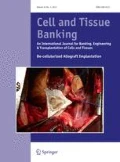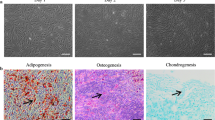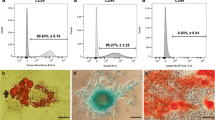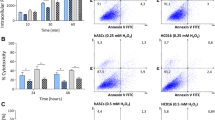Abstract
Low survival rate of grafted mesenchymal stem cells (MSC) in injured tissue is one of the major limitations of stem cell therapy. One of the most important factors that limits the MSCs survival rate and retention is ischemic stress, which can lead to damage to all components of the cell. In particular, it can damage mitochondria, that play an important role in apoptosis with releasing apoptotic factors. Therefore, we investigated the protective effects of Acetyl-l-carnitine (ALCAR) against serum and glucose deprivation (SGD) in adipose-derived mesenchymal stem cells (AD-MSCs). We measured cell viability, proliferation, and apoptosis in cells experiencing SGD stress for 8 h with exposure to varying concentrations of ALCAR. Results showed that ALCAR protects cells against SGD stress by reducing apoptosis. Its protective effects are associated with reductions in cleaved caspase-3 and attenuation of apoptosis. Result showed that ALCAR exhibits protective effects against SGD-induced damage to AD-MSCs by enhancing the expression of survival signals and by decreasing the expression of death signals.






Similar content being viewed by others
Abbreviations
- MSC:
-
Mesenchymal stem cells
- ALCAR:
-
Acetyl-l-carnitine
- SGD:
-
Serum and glucose deprivation
- AD-MSCs:
-
Adipose-derived mesenchymal stem cells
- ROS:
-
Reactive oxygen species
- PBS:
-
Phosphate buffered saline
- FBS:
-
Fetal bovine serum
- SVF:
-
Stromal-vascular fraction
- DMSO:
-
Dimethyl sulfoxide
- TdT:
-
Terminal deoxynucleotidyl transferase
- TUNEL:
-
dUTP-biotin nick end labeling
- PI:
-
Propidium iodide
- SEM:
-
Standard error of mean
- HGF:
-
Hepatocyte growth factor
- NGF:
-
Nerve growth factor
References
Barhwal K, Singh SB, Hota SK, Jayalakshmi K, Ilavazhagan G (2007) Acetyl-l-carnitine ameliorates hypobaric hypoxic impairment and spatial memory deficits in rats. Eur J Pharmacol 570:97–107
Bialik S, Cryns VL, Drincic A, Miyata S, Wollowick AL, Srinivasan A, Kitsis RN (1999) The mitochondrial apoptotic pathway is activated by serum and glucose deprivation in cardiac myocytes. Circ Res 85:403–414
Brodhun M, Bauer R, Patt S (2004) Potential stem cell therapy and application in neurotrauma. Exp Toxicol Pathol 56:103–112
Calderón EAR, Galarza RA, Faletti AG (2020) 3-Methylcholanthrene impacts on the female germ cells of rats without causing systemic toxicity. Toxicology 429:152328
Chavakis E, Urbich C, Dimmeler S (2008) Homing and engraftment of progenitor cells: a prerequisite for cell therapy. J Mol Cell Cardiol 45:514–522
Collins MK, Perkins GR, Rodriguez-Tarduchy G, Nieto MA, López-Rivas A (1994) Growth factors as survival factors: regulation of apoptosis. BioEssays 16:133–138
Deng J, Petersen BE, Steindler DA, Jorgensen ML, Laywell ED (2006) Mesenchymal stem cells spontaneously express neural proteins in culture and are neurogenic after transplantation. Stem Cells 24:1054–1064
Elmore S (2007) Apoptosis: a review of programmed cell death. Toxicol Pathol 35:495–516
Ferreira GC, McKenna MC (2017) l-Carnitine and acetyl-l-carnitine roles and neuroprotection in developing brain. Neurochem Res 42:1661–1675
Fleury C, Mignotte B, Vayssière J-L (2002) Mitochondrial reactive oxygen species in cell death signaling. Biochimie 84:131–141
Ghayour MB, Abdolmaleki A, Fereidoni M (2015) Use of stem cells in the regeneration of peripheral nerve injuries: an overview. Neurosci J Shefaye Khatam 3:84–98
Ghayour M-B, Abdolmaleki A, Behnam-Rassouli M, Mahdavi-Shahri N, Moghimi A (2019) Synergistic effects of acetyl-l-carnitine and adipose-derived stromal cells to improving regenerative capacity of acellular nerve allograft in sciatic nerve defect. J Pharmacol Exp Ther 118:254540
Gimble JM, Katz AJ, Bunnell BA (2007) Adipose-derived stem cells for regenerative medicine. Circ Res 100:1249–1260
Green DR, Reed JC (1998) Mitochondria and apoptosis. Science 281:1309
Gülçin İ (2006) Antioxidant and antiradical activities of l-carnitine. Life Sci 78:803–811
Hollville E, Martin SJ (2016) Measuring apoptosis by microscopy and flow cytometry. Curr Protoc Immunol 112:14–38
Kassem M, Abdallah BM (2008) Human bone-marrow-derived mesenchymal stem cells: biological characteristics and potential role in therapy of degenerative diseases. Cell Tissue Res 331:157–163
Kern S, Eichler H, Stoeve J, Klüter H, Bieback K (2006) Comparative analysis of mesenchymal stem cells from bone marrow, umbilical cord blood, or adipose tissue. Stem Cells 24:1294–1301
Kingham PJ, Kalbermatten DF, Mahay D, Armstrong SJ, Wiberg M, Terenghi G (2007) Adipose-derived stem cells differentiate into a Schwann cell phenotype and promote neurite outgrowth in vitro. Exp Neurol 207:267–274
Kulkarni G, McCulloch C (1994) Serum deprivation induces apoptotic cell death in a subset of Balb/c 3T3 fibroblasts. J Cell Sci 107:1169–1179
Li D, Zhu B, Ding L, Lu W, Xu G, Wu J (2014) Role of the mitochondrial pathway in serum deprivation-induced apoptosis of rat endplate cells. Biochem Biophys Res Commun 452:354–360
Liu Y, Song XD, Liu W, Zhang TY, Zuo J (2003) Glucose deprivation induces mitochondrial dysfunction and oxidative stress in PC12 cell line. J Cell Mol Med 7:49–56
Manfridi A, Forloni G, Arrigoni-Martelli E, Mancia M (1992) Culture of dorsal root ganglion neurons from aged rats: effects of acetyl-l-carnitine and NGF. Int J Dev Neurosci 10:321–329
Martinou J-C, Youle RJ (2011) Mitochondria in apoptosis: Bcl-2 family members and mitochondrial dynamics. Dev Cell 21:92–101
Palmerini M, Nottola S, Anidito T, Bianchi S, Sato E, Macchiarelli G (2017) A co-culture system supplemented by hormones and growth factors as model to reduce granulosa cell apoptosis in vitro. Int J Reprod Biomed 15:7–8
Pardo OE, Arcaro A, Salerno G, Raguz S, Downward J, Seckl MJ (2002) Fibroblast growth factor-2 induces translational regulation of Bcl-XL and Bcl-2 via a MEK-dependent pathway correlation with resistance to etoposide-induced apoptosis. J Biol Chem 277:12040–12046
Pillich RT, Scarsella G, Risuleo G (2005) Reduction of apoptosis through the mitochondrial pathway by the administration of acetyl-l-carnitine to mouse fibroblasts in culture. Exp Cell Res 306:1–8
Potier E, Ferreira E, Meunier A, Sedel L, Logeart-Avramoglou D, Petite H (2007) Prolonged hypoxia concomitant with serum deprivation induces massive human mesenchymal stem cell death. Tissue Eng 13:1325–1331
Rebouche CJ (2004) Kinetics, pharmacokinetics, and regulation of l-carnitine and acetyl-l-carnitine metabolism. Ann N Y Acad Sci 1033:30–41
Revoltella RP, DalCanto B, Caracciolo L, D’Urso CM (1994) l-carnitine and some of its analogs delay the onset of apoptotic cell death initiated in murine C2. 8 hepatocytic cells after hepatocyte growth factor deprivation. Biochim Biophys Acta (BBA) Mol Cell Res 1224:333–341
Sahara S, Aoto M, Eguchi Y, Imamoto N, Yoneda Y, Tsujimoto Y (1999) Acinus is a caspase-3-activated protein required for apoptotic chromatin condensation. Nature 401:168–173
Shi R-Z, Li Q-P (2008) Improving outcome of transplanted mesenchymal stem cells for ischemic heart disease. Biochem Biophys Res Commun 376:247–250
Taglialatela G, Angelucci L, Ramacci M, Werrbach-Perez K, Jackson G, Perez-Polo J (1991) Acetyl-l-carnitine enhances the response of PC12 cells to nerve growth factor. Dev Brain Res 59:221–230
Toma C, Pittenger MF, Cahill KS, Byrne BJ, Kessler PD (2002) Human mesenchymal stem cells differentiate to a cardiomyocyte phenotype in the adult murine heart. Circulation 105:93–98
Zhang R, Zhang H, Zhang Z, Wang T, Niu J, Cui D, Xu S (2012) Neuroprotective effects of pre-treament with l-carnitine and acetyl-l-carnitine on ischemic injury in vivo and in vitro. Int J Mol Sci 13:2078–2090
Zhu W, Chen J, Cong X, Hu S, Chen X (2006) Hypoxia and serum deprivation-induced apoptosis in mesenchymal stem cells. Stem Cells 24:416–425
Acknowledgments
The authors would like to thank Dr. Ann Paterson for assisting with the English.
Authors' contributions
Participated in research design: Ghayour, Abdolmaleki, Conducted experiments: Ghayour, Abdolmaleki, Behnam, Performed data analysis: Ghayour, Abdolmaleki, Wrote or contributed to the writing of the manuscript: Ghayour, Abdolmaleki, Behnam.
Funding
Research Council of Ferdowsi University of Mashhad.
Author information
Authors and Affiliations
Corresponding author
Ethics declarations
Conflict of interest
The authors declare that they have no Conflict of interest.
Ethical approval
All animal experiments were carried out in accordance with the European Communities Council directive of 24 November 1986(86/609/EEC) and in accordance with local University of Ferdowsi committee for Human and Animal ethics.
Additional information
Publisher's Note
Springer Nature remains neutral with regard to jurisdictional claims in published maps and institutional affiliations.
Rights and permissions
About this article
Cite this article
Abdolmaleki, A., Ghayour, MB. & Behnam-Rassouli, M. Protective effects of acetyl-l-carnitine against serum and glucose deprivation-induced apoptosis in rat adipose-derived mesenchymal stem cells. Cell Tissue Bank 21, 655–666 (2020). https://doi.org/10.1007/s10561-020-09844-1
Received:
Accepted:
Published:
Issue Date:
DOI: https://doi.org/10.1007/s10561-020-09844-1




